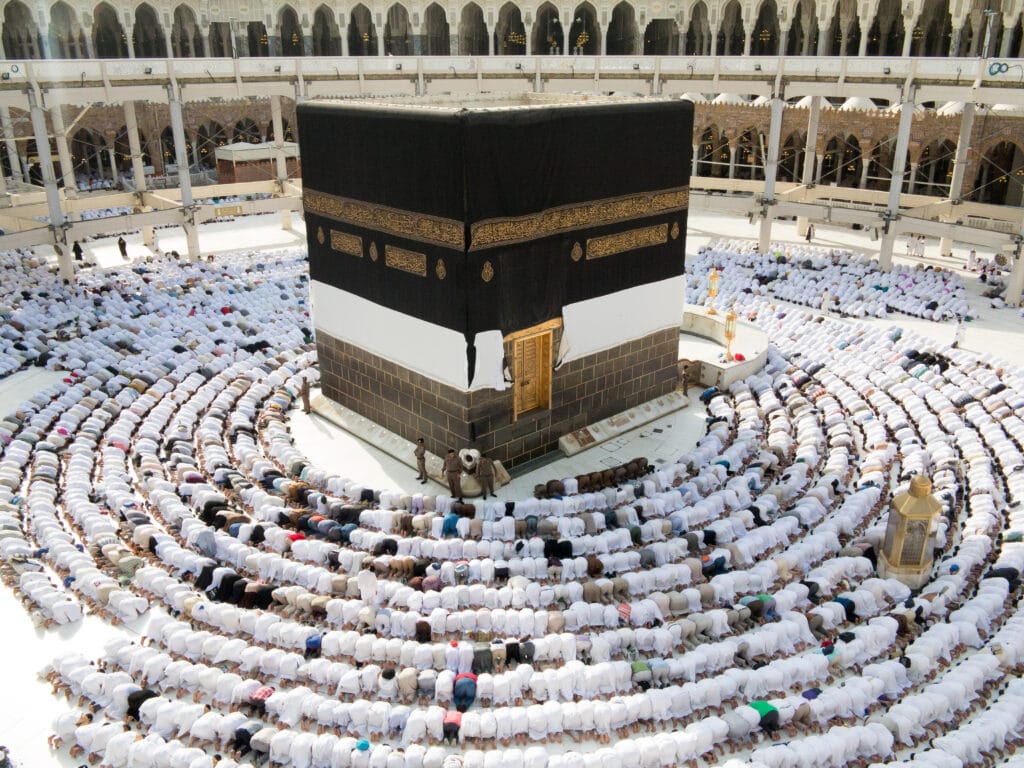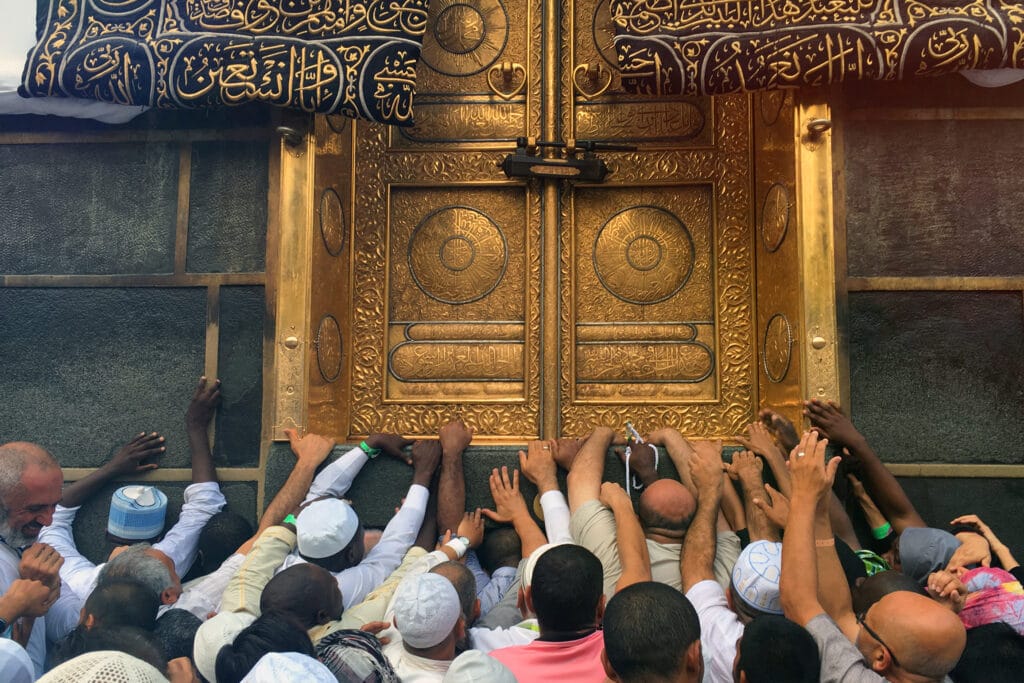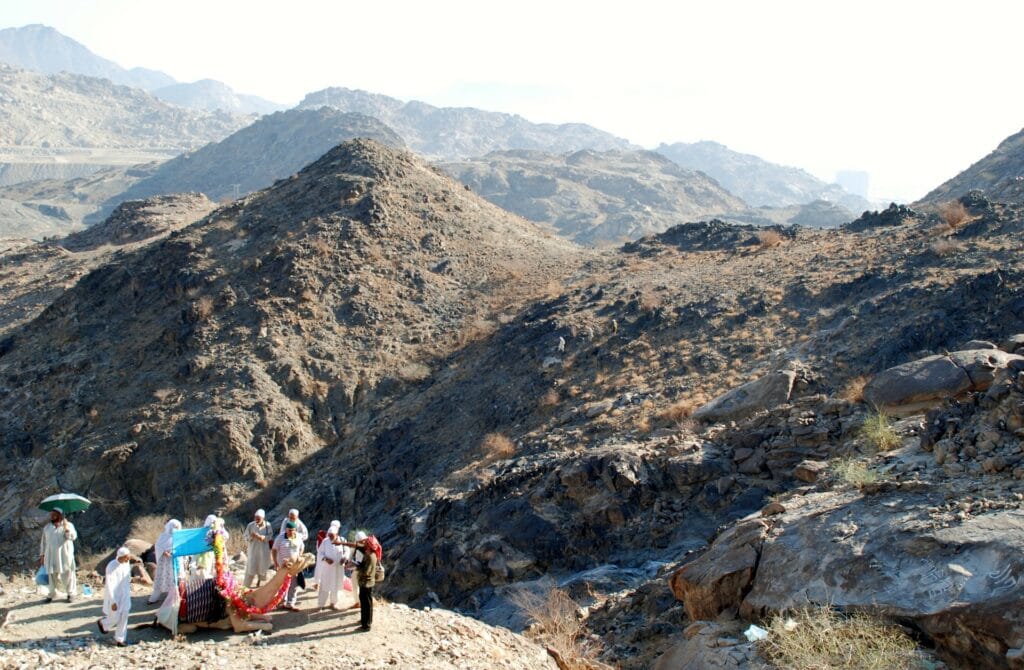The Month of Hijjah and the Sacred Pilgrimage to Mecca

The Month of the Pilgrimage, Dhul Hijjah, is the final month in the lunar calendar. This month is full of immense blessings and spiritual opportunities and in it Allah manifests a great sign of His Unity to everyone.As one of the four sacred months, the importance of Dhul Hijjah cannot be overstated, most notably because on the eighth, ninth, and tenth days of the month believers observe the fifth pillar of Islam, the Pilgrimage (Hajj).
Allah endowed the first ten days and nights of this month with special blessings for the entire community. The Prophet, sallallahu ‘alayhi wa sallam, said:
“There are no days greater and more beloved to Allah than these [first] 10 days of Dhul Hijjah, so increase your declaration of la ‘ilaha illa-llah, your exaltation of Him, and your praise of Him” (Reported by Ibn Umar, Musnad Aḥmad 5446).
As always, we provide online programming during the first ten days of Dhul Hijjah based on our beloved guide’s teachings (may Allah preserve his secret) on the inner meaning of Hajj: to return to the Source of our existence in the purest way possible. We have gathered beloveds who have experienced Hajj and who have studied deeply to support us in our walking and understanding. May Allah guide them and us and help us all to return to Him in the deepest way possible. Amin.
The First 10 Days and Nights
These ten days and nights are a “special time” as our guide Sidi Muhammad al-Jamal says. They are so special that Allah says in His Qur’an, “[I swear] by the dawn – and the ten nights.” (Qur’an 89:1-2). Most of the scholars say that Allah is referring to the first 10 days/nights of Dhul Hijjah in this verse, though some believe He is mentioning the last ten days and nights of Ramadan. That Allah saw fit to swear by them is no light matter. When Allah swears by something, it is because He is wishing to inform us of its elevated status and praiseworthy reality. He is magnifying it in our consciousness as a thing of wonder and a sign of His Majesty. He doesn’t pick something obsolete or trivial to swear by. It is as though He is saying: “Look at all of the trillions of things that I have created. I have so many creations that if you examine them generally or in detail you will be left incapacitated in awe. Yet out of all of those things in existence I have singled out this particular reality and chosen to swear by the truth of this thing as a sign of my Reality.”
Listen to a Teaching on the Basics of Hajj and the Ka’ba
How to Make the Most of This Time

Avail yourself to the Divine Blessings hidden in these ten days by drawing close through increased worship and abundant acts of service for Allah. Enter the Divine Presence through as many doorways as possible: prayer, giving charity, fasting, and/or reciting Qur`an.
- Try to be in constant remembrance and keep your tongue wet with dhikr such as: “astaghfirallah” (asking forgiveness), salawat (prayers on the Prophet), remembering “la ilaha illa-llah” or the Name “Allah.”
- Supplicate to Allah (du’a) abundantly, as this is a special time when Allah answers prayers.
- Try to increase the extra prayers that you normally do by praying salat ul-tasbih and tahajjud (the night vigil prayer in the last third of the night).
- In this night first pray four rak’ah of salatu-l-‘isha without the witr prayer. Then form a circle, and with closed eyes recite: allahumma salli ‘ala sayyidina muhammadin wa ‘ala alihi wa sahbihi wa sallim. Repeat this until your heart is full. Then stand and make two rak’ah of prayer. Do as many nafl prayers as you can – two and two and two. Then in your last two prayers, before you say as-salamu ‘alaykum wa rahmatullah, make du‘a for everyone you want and for everything you want, and then make du‘a for yourself and make tawba; and than make taslim: as-salamu ‘alaykum wa rahmatullah and do witr prayer.
- Explanation of why this practice is important: Allah says, “‘inna-llaha wa malaa’ikatahu yusalluna ‘alaa nabiyy ya ‘ayyuha-l-ladhina ‘amanuu sallu ‘alayhi wa sallimu tasliima” and when “you” say this, the angels on your right and on your left join you in your salah, and when you finish saying this, Allah says, “Amin.” This is the baraka and also, the Prophet, salla-llahu ‘alayhi wa-sallam, visits the hadra.
- Give extra sadaqa (charity) in this month. Every bit of charity you give is normally rewarded times ten. So if a person gave a dime they would receive a dollar. If they gave $10 they would normally receive $100. But during these ten days if one gives $10 Allah will bring you $7,000 as a reward. Who could refuse His generosity?
- Fasting all or some of these 10 days is highly recommended. Each day in these 10 days Allah rewards you as though you fasted and entire year, except for the 9th day of Dhul-Hijjah, in which Allah rewards you as fasting two years.
- Of course the best activity you could do if you can afford it, is to perform the Hajj (pilgrimage) and `Umrah (the lesser pilgrimage). If you can’t go there, try to connect to this great event and its deep meanings by reading from Sidi’s books: “Al-Hajj al-Akbar” from Music of the Soul and “Hajj: The Greater Pilgrimage” from The Deeper Meaning Behind the Pillars of Islam, and “The Pilgrimage” from Walking the Path of Sufism.
About Hajj (The Pilgrimage)
Hajj is the pilgrimage to the Ka’ba (the Holy House in Makkah) which is located in Saudi Arabia. It is the fifth pillar of Islam and is considered both an obligation on those who believe and the paramount spiritual practice of our way. Every year millions of people of every gender, age, nation, and background gather in Mecca for days eight, nine, and ten of Dhul-Hijjah to share a single purpose: to worship, serve and draw near to Allah. You can imagine that with all these millions of people coming together only to worship Allah and invoke blessings and peace on the world surely has an effect on the entire planet.
During Hajj, the pilgrims follow the outward and inward spiritual path of the Prophets Adam, Ibrahim, Isma`il, and Muhammad, may Allah bless them all with His mercy. In this immense spiritual practice they literally retrace the footsteps of the holy prophets, performing the same actions that they performed, working inwardly to try reach to their inward states.
Hadith On Hajj
Our Master the Prophet Muhammad said:
- When asked about which deed is best: “Belief in Allah and His Messenger, [then] jihad for the sake of Allah, [then] an accepted Hajj.”
- “The best and most beautiful of jihad is Hajj.”
- “Keep on doing Hajj and ‘Umrah, for they eliminate poverty and sin just as the bellows eliminate impurities from iron and gold and silver.”
- “Whoever does Hajj for the sake of Allah and does not have sexual relations (with his wife), commit sin, or dispute unjustly during the Hajj, will come back like the day his mother gave birth to him.”
- “Umrah is expiation for the time between it and the previous ‘Umrah, and an accepted hajj has no less a reward than Paradise.”
Day of ‘Arafah

The 9th day of Dhul Hijjah is called the Day of Arafah, when all of the pilgrims arrive at the Mount of Mercy. It is said that this place is where Adam and Hawa met after traveling all over the Earth seeking to complete themselves. At this spot, Allah forgave them from their sin and bestowed the first revelation upon them. Every year the pilgrims stand on the Mount of Mercy asking for forgiveness and hoping for a glimpse of Allah in the eye of their spirit. The Prophet told us “Hajj is Arafah” emphasizing the importance of this ritual and the realities that lay inside of it. For those who cannot make Hajj, try to fast on this day! One should also try to spend the night in worship, asking Allah for what one needs abundantly, because this is a night where Allah does not reject any prayers that you make.
Giving a Sacrifice
Sidi taught us that “making a sacrifice”, which means to donate an amount of money that is meaningful to you to feed, clothe, and shelter the poor, is an important part of our spiritual path. When we give away something we’re attached to (in this case, money) it purifies the lower ego/nafs and shows Allah that we are committed to our spiritual growth and our ultimate goal of fully embodying the stations of fana’ and baqa’ and being in complete service to Allah, Most High. Click here to learn more about why we give a sacrifice.
‘Eid al-Adha

Eid al-Adha is the feast of sacrifice. Except for the pilgrims, every Muslim community around the world is gathering for this holiday. Everyone should try to attend the ‘Eid prayer. It is the best of all sunnah prayers and consists of two rak’ah of special salah followed by two short sermons similar to the Jumu’ah prayer. Before the Eid prayer, people will gather in the mosque to recite a special dhikr called “takbir” for 20 minutes or so. Then after the Eid prayer Muslim men are required (if they can) to make a sacrifice of a sheep or a goat following the tradition of our beloved Prophet Ibrahim, alayhi-s-salam. The meat is divided into thirds: one-third is for oneself, one-third is for one’s relatives, and one-third is for the poor, so that everyone can eat. It is the tradition of our Prophet to recite the takbir for a few minutes after each salah (beginning with the Eid prayer) for the day of Eid and the two days following.f
Umrah
Umrah is a highly recommended religious observance that can be performed any time of the year except during Hajj. Though it is often called the “Lesser Pilgrimage” it is a sublime experience for many.
The Prophet Muhammad was known to have said:
“Verily, the Umrah pilgrimage during Ramadan is equal to Hajj.”
(Bukhārī 1782, Ṣaḥīḥ Muslim 1256)
Umrah and Hajj are very similar, the main differences being that Hajj is an obligatory observance for Muslims while Umrah is not. Hajj is only observed during specific days of the year, as described above, while Umrah can take place at any time except during Hajj. There are some differences in the way Umrah and Hajj are observed and Umrah can take less time to perform than Hajj.